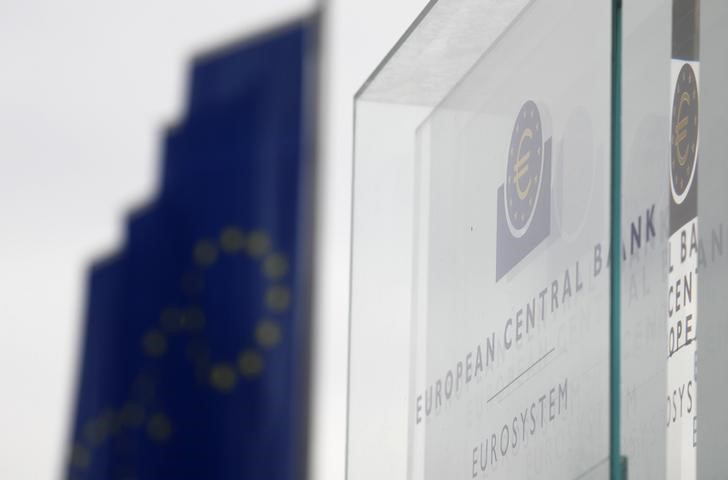(Bloomberg) -- As a player in the robot-car revolution, Valeo (PA:VLOF) SA used to be a stock market darling. But a slowdown in China and changing rules on emissions hammered the shares and hit its credit rating.
You wouldn’t know it looking at the debt market. The yield on a Valeo bond due in 2022 slipped below zero last month while five other notes are trading at less than 0.6%.
It looks like a golden opportunity for the French firm to gorge on ultra-cheap borrowing. Yet it isn’t interested -- and the restraint tells you everything about the European Central Bank’s uphill battle to revive animal spirits.
“Low interest rates are like a mild drug,” said Chief Executive Officer Jacques Aschenbroich. “There’s an addicting effect that we want to avoid. We don’t say: debt is cheap so we will pile up debt.”
Valeo joined the likes of Unilever (LON:ULVR) NV and SAP SE (DE:SAPG) in the 1.1 trillion euro ($1.2 trillion) global pool of corporate debt trading with yields below zero, according to data compiled by Bloomberg. The stockpile of negative obligations across all markets hit a record $16.7 trillion last week, and could swell further as the ECB preps fresh stimulus.
If companies lock in these rates in the primary market, they could in effect be getting paid to borrow. But don’t expect a borrowing binge to finance acquisitions or share buybacks. Growing signs that Europe is headed into a recession mean treasurers have plenty of reasons to resist.
“Leverage in Europe is low and it could stay that way -- even though many companies are able to issue debt with negative or record-low yields,” said Mahesh Bhimalingam, a credit strategist at Bloomberg Intelligence. “It’s hard to see the appeal of loading up on debt to make an investment when the potential return on that investment looks highly uncertain, given the outlook in Europe.”
French luxury goods maker LVMH and drugmaker Sanofi (PA:SASY) are among a small handful that issued debt this year with negative yields -- the securities had a coupon of zero and investors paid more for them than the face amount. It’s hardly a wave.
For that to happen, companies may need to reconsider the restraint they’ve shown since the ECB started cutting rates and buying debt. Weak confidence in the outlook for growth and profits will only entrench their reluctance.
The average ratio of net debt to operating earnings before interest, tax, depreciation and amortization for European investment-grade corporate bonds was 1.7 times in 2009, according to Fitch Ratings Inc. The rating company forecasts average leverage of just 1.6 times in 2019.
“This is the time to take debt because you can lock it in for 30 years,” said Sharon Katz, associate professor of accounting and control at Insead Business School in Fontainebleau, France. “Not all companies will go for it. If you have a cash flow problem, you still need to pay the principal at some point.”
Consider Altice Europe NV. Only a few years ago, the Amsterdam-based telecommunications company was well known in the debt market for its soaring leverage. So even though the yield on one of its securities turned negative in July, it’s keeping the focus on cutting borrowing and disposing assets.
“We expect to significantly reduce interest expense in the next two years as we are deleveraging rapidly,” Dennis Okhuijsen, an adviser to the company, said on an earnings call last month. “As always we are refinancing and reviewing our refinancing options.”
Don’t rule out a shift by executives entirely. Shareholders could become an important source of pressure on treasurers, Bank of America Merrill Lynch (NYSE:BAC) Corp. analysts led by Barnaby Martin said in a recent note. The issuance could finance mergers, dividend payments or to plug gaps in cash flow, they said.
“It’s quite possible that a company could be tempted to take on ever more leverage in a world where earnings growth is more feeble,” said Oystein Borsum, strategist at Swedbank AB. “How else are you going to get earnings going?”
European firms can be forgiven for failing to spot a raft of investment opportunities in a world of weak demand and policy uncertainty. Many seem aware of the risks. Nordic brewer Carlsberg (CSE:CARLa) A/S, for one, has focused on cutting debt and reducing costs in recent years.
“The moment you get seduced by low rates and companies feel like they have to use them to do very big things -- maybe bigger than they can absorb -- they have to remember they all have to pay the bill later,’’ said Cees ’t Hart, CEO of Carlsberg. “There are many companies that have been a lot more aggressive than we have who have then gotten into problems afterwards.”
If corporates don’t play ball, it raises questions about whether the ECB’s fresh round of stimulus would revive business activity and inflation. Gross domestic product in Germany shrank in the second quarter. The Bloomberg Intelligence global GDP tracker shows growth of just 2.4% in the second quarter.
Doubling down on the ECB’s existing toolkit “simply won’t work any more,” Philipp Hildebrand, vice chairman at BlackRock (NYSE:BLK) and former head of the Swiss National Bank, said in an interview on Bloomberg Television.
